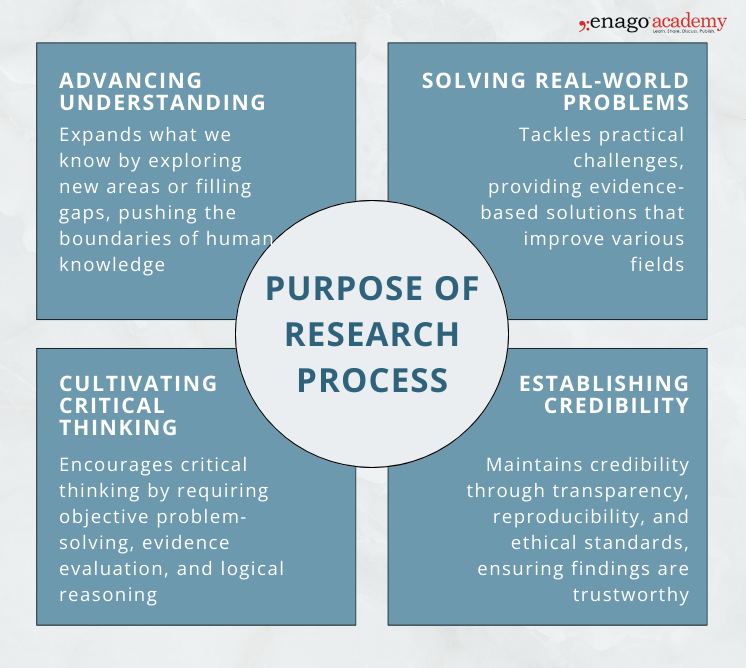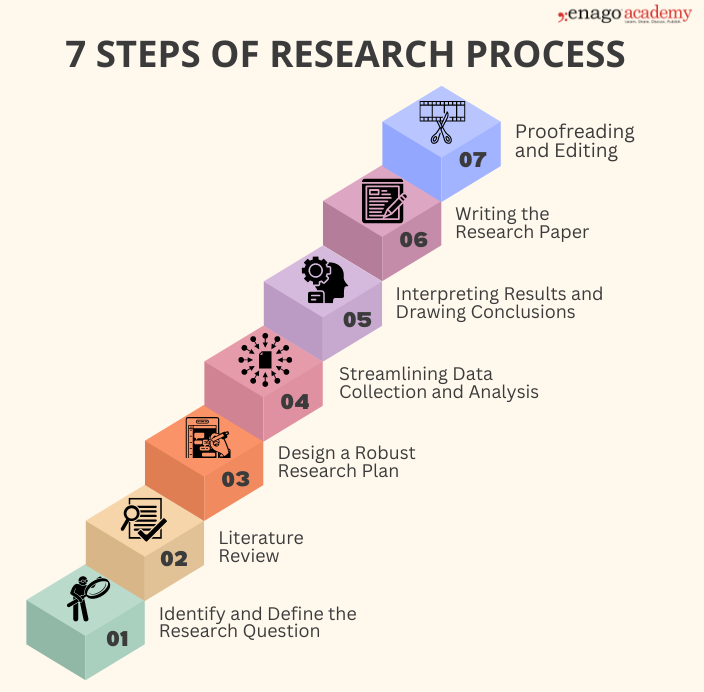How to Optimize Your Research Process: A step-by-step guide

For researchers across disciplines, the path to uncovering novel findings and insights is often filled with uncertainties. From conceptualizing a viable research question to navigating through the vortex of data and information available today, the research process can be a bit daunting.
However, through these challenges lies a path of unparalleled intellectual growth and self-discovery. This path of research process, when approached with diligence and systematic thinking can refine your logical reasoning, organizational abilities, and capacity for critical analysis. Each correct step on this road makes you one step closer to your discovery.
Understanding the Research Process
The research process is a structured approach to acquiring knowledge and generating new insights. It is a methodical journey that begins with identifying a research problem or question and leads to dissemination of findings that contribute to the existing body of knowledge.
The research process serves multiple purposes, including advancing understanding, solving real-world problems, fostering critical thinking, and establishing credibility.

The skills acquired during the research process such as critical thinking, problem-solving, and effective communication become invaluable assets that further propels the growth of a researcher.
Steps of a Research Process
The research process unfolds in a meticulous, step-by-step manner, with each stage informed by the preceding one. Ensuring the efficacy of your research demands unwavering attention to detail, diligent execution at each stage, and a commitment to learning, irrespective of the challenges that may arise.
 1. Identify and Define the Research Question
1. Identify and Define the Research Question
The foundation of any successful research endeavor lies in the formulation of a compelling research question. Starting strong at this important stage will set the tone for your entire project’s journey.
It involves:
i. Identifying a specific area of interest that pique your curiosity or align with your research goals.
ii. Refining it into a focused and researchable query. Remember, that a well-crafted research question should be clear, concise, and answerable within the constraints of your resources and timeline.
2. Literature Review
The next step is to immerse yourself in the existing body of knowledge. Conducting a comprehensive literature review is an indispensable component of the research process, as it provides a solid theoretical foundation. By examining previous research, theories, and methodologies, you gain a deeper understanding of the current state of knowledge within your area of interest.
It further reveals gaps and inconsistencies that have been overlooked or insufficiently explored, highlighting opportunities for new insights.
In today’s digital age, AI-powered tools like Enago Read can be used for research summarization. Such tools help streamline this process, enabling you to efficiently summarize vast literature sources to find relevant information.
3. Design a Robust Research Plan
This step is like laying the blueprint for your intellectual journey. Without a plan you would be lost. Crafting a robust research plan ensures that your research is built on a solid foundation of sound methodology and rigorous inquiry. It encompasses determining your research methodology, identifying the appropriate data collection techniques, and laying down a clear analytical framework.
4. Streamlining Data Collection and Analysis
This phase lies at the heart of your research endeavor, where you transform your theoretical constructs into tangible findings.
It involves:
i. Meticulously gathering data from various sources depending on your research design. Regardless of the source employed for data collection, it is essential to adhere to strict protocols and maintain rigorous standards throughout this process. This will ensure the validity and reliability of your data.
ii. Subjecting the gathered data to rigorous analytical techniques that aligns with your research design and objectives.
iii. Leveraging advanced data analysis tools and statistical software to enhance the accuracy and efficiency of your analyses. These powerful resources can streamline complex calculations, visualize patterns, and uncover insights that may be difficult to discern through manual processes alone.
Throughout this phase, it is essential to maintain meticulous documentation and adherence to ethical guidelines, ensuring that your research practices are transparent, replicable, and respectful of human subjects or other considerations.
5. Interpreting Results and Drawing Conclusions
You can now embark on the exciting task of interpreting your results and drawing meaningful conclusions. This step requires a delicate balance of critical thinking, objectivity, and a keen ability to synthesize your findings within the broader context of your research question and existing literature.
i. Approach your results with a critical mindset. Challenge your assumptions and consider alternative explanations or interpretations.
ii. Identify how your findings corroborate, contradict, or expand upon previous research, and explore the implications for your field.
iii. If your research involved the formulation of hypotheses, this is the stage where you assess whether your data supports or refutes them. Be prepared to embrace unexpected or counterintuitive findings, as they often pave the way for groundbreaking discoveries.
iv. Remember, no research is perfect, and it is crucial to acknowledge the limitations of your study. It will pave the way for future investigations to build upon your findings.
6. Writing the Research Paper
The culmination of your research journey is the writing of the research paper. This step demands a delicate balance of precision, clarity, and adherence to established academic conventions.
i. Your research paper should effectively convey the essence of your study, articulating your research question, methodology, results, and conclusions in a logical and compelling manner.
ii. Each discipline has its own set of writing conventions, including specific formatting guidelines, citation styles, and structural expectations. Familiarize yourself with these conventions and ensure that your paper adheres to them rigorously.
iii. A well-crafted research paper should seamlessly weave together the various components of your study, creating a cohesive narrative that guides the reader through your intellectual journey.
Follow the tips given below to write an effective research paper:
Sign Up for More InsightsThroughout the writing process, seek feedback from peers, mentors, or professional editing services to ensure that your work is polished, well-reasoned, and accessible to your intended audience.
7. Proofreading and Editing
Before submitting your research paper for publication or evaluation, it is crucial to meticulously proofread and edit your work. This step ensures that your research is presented in the most professional and polished manner possible, free from errors or inconsistencies that could detract from the clarity and impact of your message.
Carefully review your paper for any typos, spelling mistakes, or deviations from the prescribed formatting guidelines. These seemingly minor errors can undermine the credibility of your work.
Ensure that your writing is concise, unambiguous, and effectively conveys the nuances of your research. Avoid jargon or convoluted language that could obscure your findings.
Tools like Trinka can proofread and check your entered text for grammatical errors, thus enhancing the accuracy and efficiency of this process. These advanced algorithms can identify and correct a wide range of errors, allowing you to polish your work to perfection.
Maintaining a spirit of curiosity, perseverance, and adherence to ethical practices is key throughout this journey. By embracing these steps and leveraging the power of AI-assisted tools, you can navigate the research process with confidence, ultimately contributing to the advancement of knowledge within your field of study.
Sharing your research findings in a journal marks a notable achievement in your academic journey. Yet, enhancing your visibility as a researcher can be achieved by communicating your work through simplified summaries. Consider submitting your plain language research summary to our Open Platform, allowing your work to reach a wide and diverse audience within the academic community.
Frequently Asked Questions
The purpose of the research process is to advance understanding, solve real-world problems, foster critical thinking, and establish credibility of the research findings.
Optimizing your research process enhances efficiency, improves research quality, increases the likelihood of producing meaningful insights, and enhances your credibility as a researcher
Assessing the reliability of a source for research involves several factors. These include looking for peer-reviewed publications from reputable journals or academic publishers, checking the credentials of the author or organization to gauge their expertise and credibility, and evaluating the relevance of the information to ensure it aligns with your research goals. Furthermore, cross-reference the source with other reputable sources to verify its accuracy and validity.
Staying organized during the research process is essential for efficiency and effectiveness. Start by clearly defining your research question and objectives. Furthermore, create a detailed timeline, maintain thorough records, use citation managers and databases, establish a filing system, and regularly review progress to stay organized and address challenges promptly.







 Explain the ‘what’ and ‘why’ of the methods implemented in your study for data collection and data analysis.
Explain the ‘what’ and ‘why’ of the methods implemented in your study for data collection and data analysis. Use tables and graphs in your results section to keep it precise to aid with the clarity of your findings.
Use tables and graphs in your results section to keep it precise to aid with the clarity of your findings. Interpret the results for the discussion section and compare it with similar studies conducted in the past.
Interpret the results for the discussion section and compare it with similar studies conducted in the past. Keep your conclusion assertive and summarize the key findings. Highlight the broader implications of your study.
Keep your conclusion assertive and summarize the key findings. Highlight the broader implications of your study.



